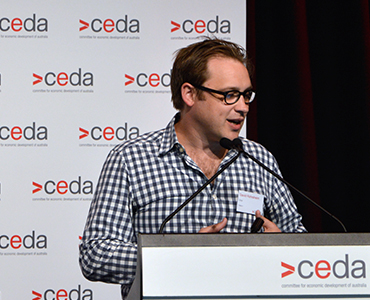Start-ups cannot wait for government otherwise they will take their business somewhere else, UBER Australia and New Zealand General Manager, David Rohrsheim told a CEDA audience in Brisbane.
 Speaking at urban futures, Mr Rohrsheim’s comments come after an announcement from the Queensland government of a review of the state’s taxi plan including ride-sharing services, due in August 2016.
Speaking at urban futures, Mr Rohrsheim’s comments come after an announcement from the Queensland government of a review of the state’s taxi plan including ride-sharing services, due in August 2016.
“We’re talking two plus years from the introduction of an idea, to any sort of response from the government,” he said.
“Uber is a business with a whole lot of funding and backing, we can afford to wait but the average entrepreneur, the average start up cannot wait two years for a response from government when they’ve got a new idea, an innovative idea that hundreds of thousands of people are already using.
“They will take their business elsewhere. They will take their idea elsewhere.”
Mr Rohrsheim also said that the city’s infrastructure is a “hugely wasted and depreciating asset.”
“A city like Brisbane probably has over a million cars, with tens of billions of dollars of infrastructure that is typically used less than one hour a day, and when it is used, probably has four empty seats,” he said.
“With the Uber app, we are tapping into the cars that the city already has. We are rolling out transportation infrastructure at the speed of the internet.
“That is what the sharing economy is about, making use of the assets the city already has.”
Also speaking at urban futures was AECOM Managing Director, Design and Planning, James Rosenwax who said that the right infrastructure supported by innovative funding will be essential in ensuring Australian cities remain competitive in the “urban century”.
Mr Rosenwax said the recent change of leadership was positive for funding infrastructure, noting the recent federal funding commitment of $95 million to a Queensland light rail project.
“Prime Minister Malcolm Turnbull understands that productivity is critically important to Australia, to maintain our relevance on the global stage and you’re not going to get that productivity if you’re focusing on big roads and joining our cities. You’re going to get that productivity if you focus on how our cities actually function and relate to each other,” he said.